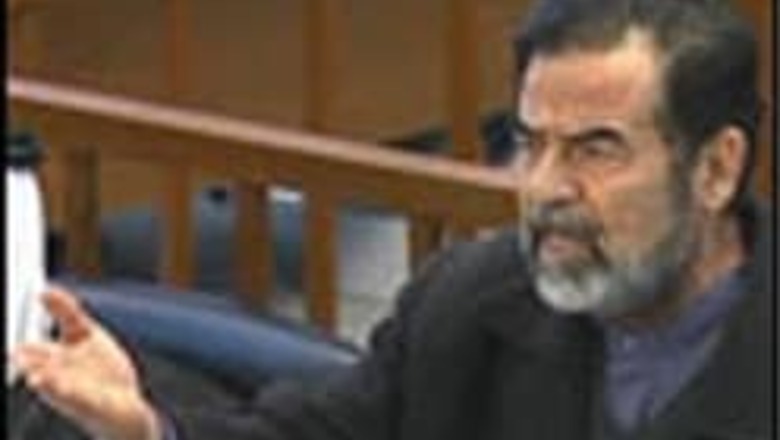
views
Baghdad (Iraq): Saddam Hussein was sentenced to death by hanging on Sunday for his role in a brutal crackdown nearly 25 years ago in Dujail — the once obscure Iraqi town that is now a symbol of his regime's cruelty.
Also sentenced to death were Barzan Hassan, Saddam Hussein's half-brother and former head of the intelligence agency, and Awad Bandar, the former chief judge of the Revolutionary Court.
Bandar repeatedly screamed Allahu Akhbar (God is great) as he was being taken out of court.
On January 29, Hussein was dragged from the room after calling the court, "Daughter of a whore."
"This is very clear, and I tell the people today that the verdict was predetermined and has nothing to do with court proceedings," Ramadan said.
Three other defendants were each sentenced three to 15 years in jail, and one was acquitted.
But the well-publicized proceeding itself has been on trial, playing to some dismal reviews. TV viewers watching snatches of the trial have been dismayed by the courtroom chaos. Attorneys and human rights observers say the proceeding has been wracked with problems.
At the beginning, it was startling, a bit scary and stunning for Iraqis to see their former all-powerful leader hauled into a courtroom.
But it didn't take long for the session to deteriorate into chaos and prompt more snickering than sober reflection as people testified about the government crackdown in the Shiite town of Dujail in 1982. The testimony took a back seat to the theater.
The trial was marred by defense team walkouts and boycotts, defendants on hunger strikes, defendants dragged out kicking and screaming, sessions with no defendants, and one defendant, Barzan Hassan, dressed in underwear.
At one point, on December 6, Hussein told Judge Rizgar Amin, "Go to hell" and said he wouldn't attend the trial. On January 29, Hussein was dragged from the room after calling the court, "Daughter of a whore."
Hussein was critical of the trial proceedings, safety for lawyers, and the audacity of the new Iraqi officials for not treating him with the respect he believed he deserved, in a position he no longer has, which is that of an Iraqi president.
Protecting attorneys major concern
Hussein's legal team expressed many criticisms and concerns about the proceeding. The biggest one and the most persistent and basic was the need for safety for the attorneys in the volatile country. Throughout the Dujail trial, three defense lawyers were killed and one fled the country after he was seriously wounded.
Human Rights Watch, the watchdog group that has regularly issued reports about the Hussein regime's brutality over the years, issued several critical reports about the Dujail trial.
"The court's administration has been chaotic and inadequate, making it unable to conduct a trial of this magnitude fairly," the human rights group said.
"The court has relied so heavily on anonymous witnesses that it has undercut the defendants' right to confront witnesses against them and effectively test their evidence," it added.
Ramsey Clark and other attorneys for Hussein and his co-defendants have repeatedly denounced the fairness of the Dujail proceeding.
"It's impossible to have a fair trial where you don't protect all the participants in a trial," Clark has said.
Attorneys said they did not have full access to witnesses or evidence, and were not given enough time to prepare and carry out their defense. They also complained about the intimidation of witnesses, interrogation of defendants without their legal counsel present, interference with lawyer-client relations, a biased chief judge, and political interference in the case.
US officials close to the court agree the trial was "not a perfect process," but they also say it was "a very fair trial." The low point, they say, was when the defense attorneys were killed.




















Comments
0 comment